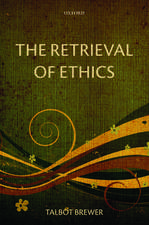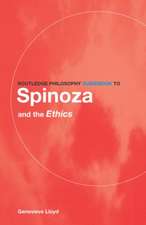The Ethics of Forgiveness: A Collection of Essays: Routledge Studies in Ethics and Moral Theory
Editat de Christel Frickeen Limba Engleză Paperback – 22 apr 2014
Forgiveness is governed by social and, in particular, by moral norms. Do those who ask to be forgiven have to fulfil certain conditions for being granted forgiveness? And what does the granting of forgiveness consist in? We may feel like refusing to forgive those perpetrators who have committed the most horrendous crimes. But is such a refusal justified even if they repent their crimes? Could there be a duty for the victim to forgive? Can forgiveness be granted by a third party? Under which conditions may we forgive ourselves?
The papers collected in the present volume address all these questions, exploring the practice of forgiveness and its normative constraints. Topics include the ancient Chinese and the Christian traditions of forgiveness, the impact of forgiveness on the moral dignity and self-respect of the victim, self-forgiveness, the narrative of forgiveness as well as the limits of forgiveness. Such limits may arise from the personal, historical, or political conditions of wrongdoing or from the emotional constraints of the victims.
| Toate formatele și edițiile | Preț | Express |
|---|---|---|
| Paperback (1) | 474.68 lei 43-57 zile | |
| Taylor & Francis – 22 apr 2014 | 474.68 lei 43-57 zile | |
| Hardback (1) | 1113.25 lei 43-57 zile | |
| Taylor & Francis – 14 feb 2011 | 1113.25 lei 43-57 zile |
Din seria Routledge Studies in Ethics and Moral Theory
-
 Preț: 295.33 lei
Preț: 295.33 lei -
 Preț: 450.59 lei
Preț: 450.59 lei -
 Preț: 311.48 lei
Preț: 311.48 lei - 9%
 Preț: 1004.84 lei
Preț: 1004.84 lei -
 Preț: 311.51 lei
Preț: 311.51 lei -
 Preț: 309.50 lei
Preț: 309.50 lei -
 Preț: 311.41 lei
Preț: 311.41 lei -
 Preț: 325.74 lei
Preț: 325.74 lei -
 Preț: 311.06 lei
Preț: 311.06 lei -
 Preț: 313.72 lei
Preț: 313.72 lei -
 Preț: 716.42 lei
Preț: 716.42 lei - 18%
 Preț: 1112.55 lei
Preț: 1112.55 lei - 18%
 Preț: 1053.16 lei
Preț: 1053.16 lei - 18%
 Preț: 1053.92 lei
Preț: 1053.92 lei - 18%
 Preț: 1106.02 lei
Preț: 1106.02 lei - 18%
 Preț: 1058.10 lei
Preț: 1058.10 lei - 18%
 Preț: 1113.60 lei
Preț: 1113.60 lei -
 Preț: 416.22 lei
Preț: 416.22 lei - 26%
 Preț: 820.32 lei
Preț: 820.32 lei - 18%
 Preț: 1119.87 lei
Preț: 1119.87 lei -
 Preț: 382.47 lei
Preț: 382.47 lei - 30%
 Preț: 846.92 lei
Preț: 846.92 lei -
 Preț: 439.24 lei
Preț: 439.24 lei - 18%
 Preț: 1000.27 lei
Preț: 1000.27 lei -
 Preț: 411.42 lei
Preț: 411.42 lei - 18%
 Preț: 1057.40 lei
Preț: 1057.40 lei - 18%
 Preț: 1051.55 lei
Preț: 1051.55 lei -
 Preț: 436.14 lei
Preț: 436.14 lei - 26%
 Preț: 762.57 lei
Preț: 762.57 lei -
 Preț: 461.66 lei
Preț: 461.66 lei - 26%
 Preț: 848.57 lei
Preț: 848.57 lei -
 Preț: 408.38 lei
Preț: 408.38 lei - 18%
 Preț: 1109.18 lei
Preț: 1109.18 lei - 18%
 Preț: 1105.94 lei
Preț: 1105.94 lei - 26%
 Preț: 820.40 lei
Preț: 820.40 lei - 26%
 Preț: 763.39 lei
Preț: 763.39 lei -
 Preț: 483.20 lei
Preț: 483.20 lei - 18%
 Preț: 1109.99 lei
Preț: 1109.99 lei - 31%
 Preț: 764.22 lei
Preț: 764.22 lei -
 Preț: 449.41 lei
Preț: 449.41 lei - 18%
 Preț: 1055.51 lei
Preț: 1055.51 lei - 26%
 Preț: 848.31 lei
Preț: 848.31 lei -
 Preț: 482.17 lei
Preț: 482.17 lei -
 Preț: 428.09 lei
Preț: 428.09 lei
Preț: 474.68 lei
Nou
Puncte Express: 712
Preț estimativ în valută:
90.83€ • 95.07$ • 75.60£
90.83€ • 95.07$ • 75.60£
Carte tipărită la comandă
Livrare economică 31 martie-14 aprilie
Preluare comenzi: 021 569.72.76
Specificații
ISBN-13: 9780415754408
ISBN-10: 0415754402
Pagini: 220
Dimensiuni: 152 x 229 x 25 mm
Greutate: 0.27 kg
Ediția:1
Editura: Taylor & Francis
Colecția Routledge
Seria Routledge Studies in Ethics and Moral Theory
Locul publicării:Oxford, United Kingdom
ISBN-10: 0415754402
Pagini: 220
Dimensiuni: 152 x 229 x 25 mm
Greutate: 0.27 kg
Ediția:1
Editura: Taylor & Francis
Colecția Routledge
Seria Routledge Studies in Ethics and Moral Theory
Locul publicării:Oxford, United Kingdom
Public țintă
Postgraduate and UndergraduateCuprins
Introduction Christel Fricke I. Historical and Intercultural Perspectives on Forgiveness 1. Forgiveness and Forbearance in Ancient China Christoph Harbsmeier 2. Unconditional Forgiveness in Christianity? Some Reflections on Ancient Christian Sources and Practices Ilaria Ramelli II. Forgiveness and Selfhood 3. What We Cannot Do to Each Other--On Forgiveness and Moral Vulnerability Christel Fricke 4. Forgiveness and the Constitution of Selfhood Garry Hagberg 5. Self-Forgiveness and the Narrative Sense of Self Peter Goldie III. Exploring the Limits of Forgiveness 6. Conditional Unconditional Forgiveness Eve Garrard and David McNaughton 7. Forgiving Without Blame Espen Gamlund 8. On Loving Our Enemies Jerome Neu 9. Can Forgiveness be Morally Wrong? Arne Johan Vetlesen 10. Apologising for Historic Injustices Geoffrey Scarre 11. Forgiveness, History, Narrative: W.G. Sebald's 'Austerlitz' Jakob Lothe
Recenzii
'While most of the contributions are works in moral theory, the volume also represents other disciplinary approaches to issues of forgiveness, including literary criticism and linguistics. The result is a satisfyingly diverse range of perspectives on the nature, justification and limits of forgiveness.'
– Linda Radzik, Texas A&M University, Notre Dame Philosophical Reviews
– Linda Radzik, Texas A&M University, Notre Dame Philosophical Reviews
Descriere
We are often pressed to forgive or in need of forgiveness: Wrongdoing is common. Even after a perpetrator has been taken to court and punished, forgiveness still has a role to play. How should a victim and a perpetrator relate to each other outside the courtroom, and how should others relate to them? Communicating about forgiveness is particularly urgent in cases of civil war and crimes against humanity inside a community where, if there were no forgiveness, the community would fall apart.
Forgiveness is governed by social and, in particular, by moral norms. Do those who ask to be forgiven have to fulfil certain conditions for being granted forgiveness? And what does the granting of forgiveness consist in? We may feel like refusing to forgive those perpetrators who have committed the most horrendous crimes. But is such a refusal justified even if they repent their crimes? Could there be a duty for the victim to forgive? Can forgiveness be granted by a third party? Under which conditions may we forgive ourselves?
The papers collected in this volume address all these questions, exploring the practice of forgiveness and its normative constraints. Topics include the ancient Chinese and the Christian traditions of forgiveness, the impact of forgiveness on the moral dignity and self-respect of the victim, self-forgiveness, the narrative of forgiveness, as well as the limits of forgiveness. Such limits may arise from the personal, historical, or political conditions of wrongdoing or from the emotional constraints of the victims.
Forgiveness is governed by social and, in particular, by moral norms. Do those who ask to be forgiven have to fulfil certain conditions for being granted forgiveness? And what does the granting of forgiveness consist in? We may feel like refusing to forgive those perpetrators who have committed the most horrendous crimes. But is such a refusal justified even if they repent their crimes? Could there be a duty for the victim to forgive? Can forgiveness be granted by a third party? Under which conditions may we forgive ourselves?
The papers collected in this volume address all these questions, exploring the practice of forgiveness and its normative constraints. Topics include the ancient Chinese and the Christian traditions of forgiveness, the impact of forgiveness on the moral dignity and self-respect of the victim, self-forgiveness, the narrative of forgiveness, as well as the limits of forgiveness. Such limits may arise from the personal, historical, or political conditions of wrongdoing or from the emotional constraints of the victims.

















